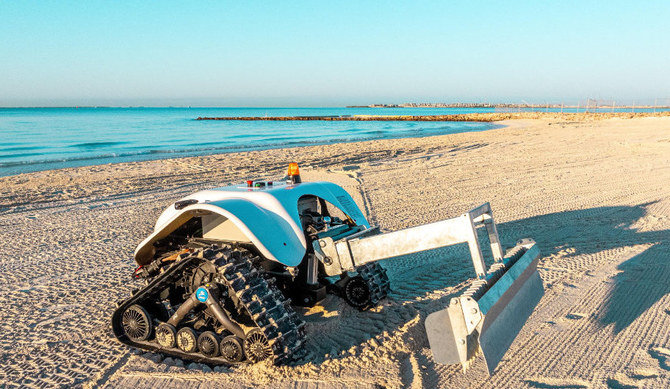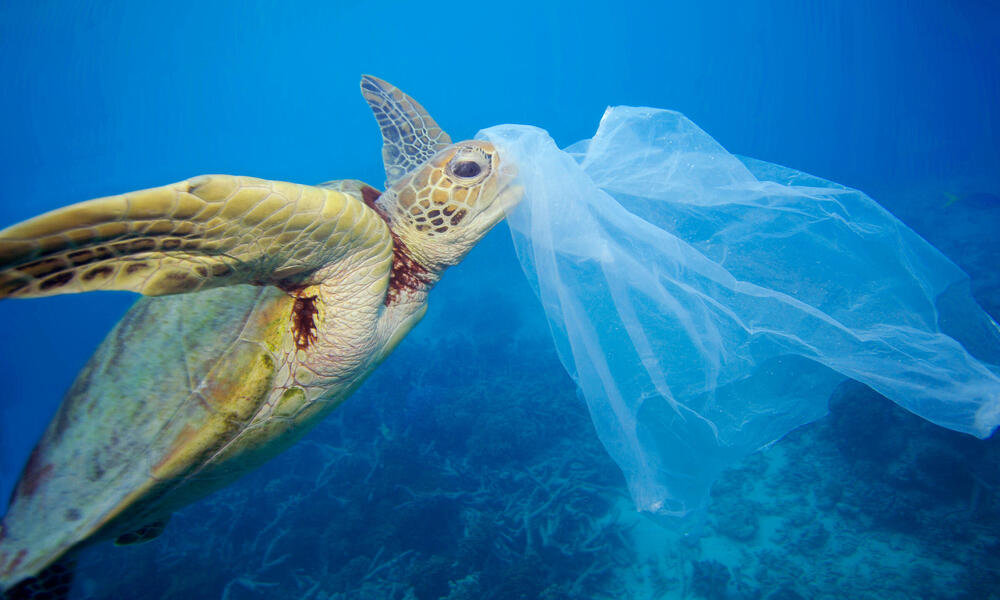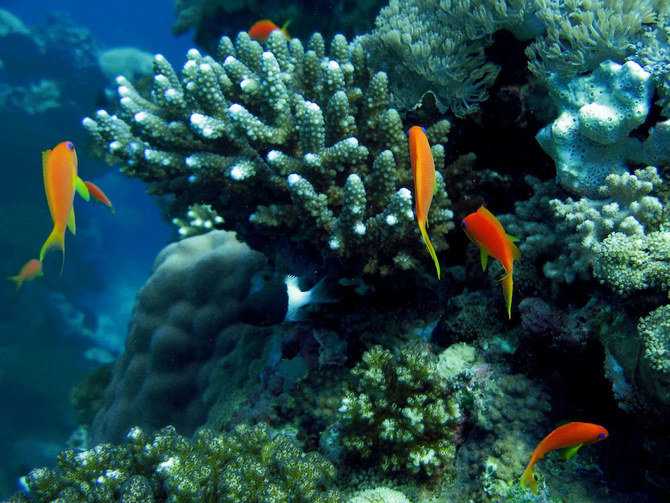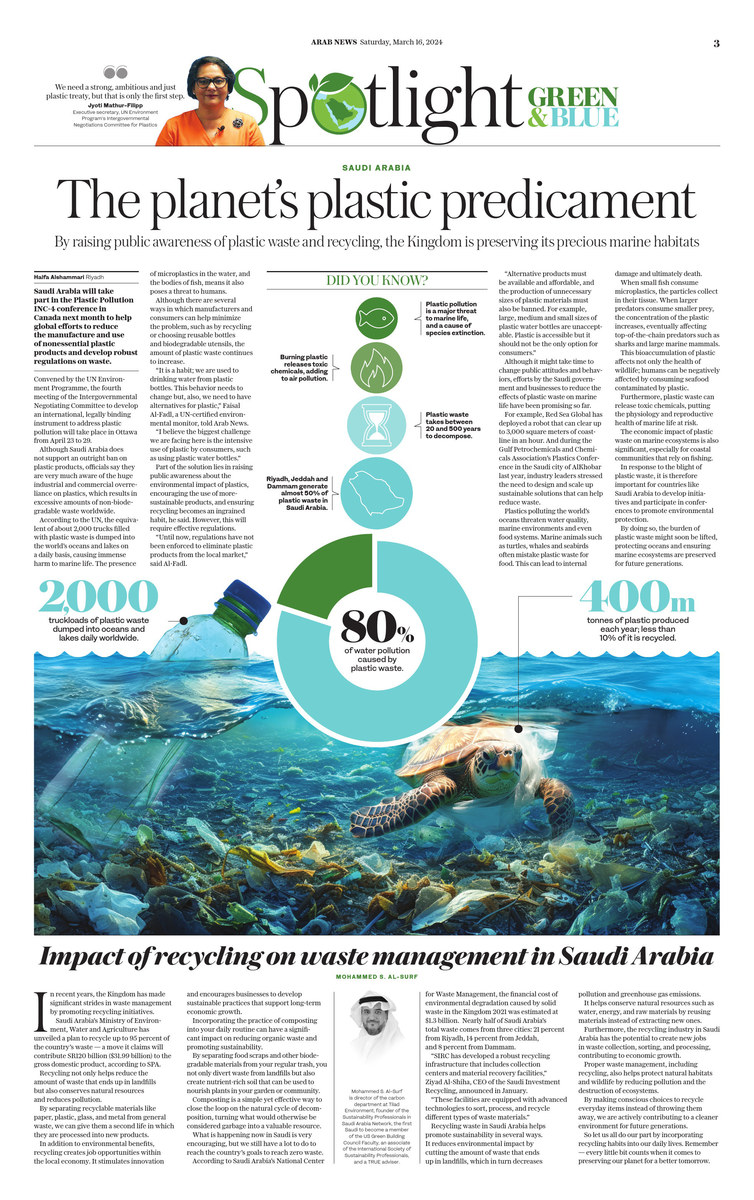RIYADH: Saudi Arabia will take part in the Plastic Pollution INC-4 conference in Canada next month to help drive global efforts to reduce the manufacture and use of non-essential plastic products and to develop robust regulations on plastic waste.
Convened by the UN Environment Program, the fourth meeting of the Intergovernmental Negotiating Committee to develop an international, legally binding instrument to address plastic pollution, including in marine environments, will take place in Ottawa from April 23 to 29.
Although Saudi Arabia does not support an outright ban on plastic products, officials say they are very much aware of the huge industrial and commercial overreliance on plastics, which results in excessive amounts of non-biodegradable waste worldwide.
According to the UN, the equivalent of about 2,000 trucks filled with plastic waste is dumped into the world’s oceans and lakes on a daily basis, causing immense harm to marine life. The presence of microplastics in the water, and the bodies of fish, means it also poses a threat to humans.

Plastic waste wash ashore in the beach next to the Panama Canal. (Shutterstock photo)
Although there are several ways in which manufacturers and consumers can help minimize the problem, such as by recycling or choosing reusable bottles and biodegradable utensils, the amount of plastic waste continues to increase. Of the 400 million tonnes of plastic produced worldwide each year, barely 10 percent is recycled.
“It is a habit; we are used to drinking water from plastic bottles. This behavior needs to change but, also, we need to have alternatives for plastic,” Faisal Al-Fadl, a representative to the UN and UNEP observer, told Arab News.
“I believe the biggest challenge we are facing here is the intensive use of plastic by consumers, such as using plastic water bottles.”
DIDYOU KNOW?
• Riyadh, Jeddah and Dammam generate almost 50% of total plastic waste in Saudi Arabia.
• Plastic pollution is a major threat to marine life and food systems.
• Plastic waste takes between 20 and 500 years to decompose.
• Burning plastic releases toxic chemicals, adding to air pollution.
Part of the solution lies in raising public awareness about the environmental impact of plastics, encouraging businesses and consumers to purchase more-sustainable products, and ensuring recycling becomes an ingrained habit, he said. However, this will require effective regulations.
“Until now, regulations have not been enforced to eliminate plastic products from the local market,” said Al-Fadl.
Opinion
This section contains relevant reference points, placed in (Opinion field)
“Alternative products must be available and affordable, and the production of unnecessary sizes of plastic materials must also be banned. For example, large, medium and small sizes of plastic water bottles are unacceptable. Plastic is accessible but it should not be the only option for consumers.”
Although it might take time to change public attitudes and behaviors, including purchasing habits, efforts by the Saudi government and businesses to reduce the effects of plastic waste on marine life have been promising so far.

Red Sea Global, the developer behind Saudi Arabia's regenerative tourism destinations The Red Sea and Amaala, has introduced cleaning robots to reduce the amount of plastic waste on beaches. (X: @RedSeaGlobal)
For example, Red Sea Global has deployed a robot that can clear up to 3,000 square meters of coastline in an hour. And during the Gulf Petrochemicals and Chemicals Association’s Plastics Conference in the Saudi city of Al-Khobar last year, industry leaders stressed the need to design and scale up sustainable solutions that can help reduce waste.
Plastics polluting the world’s oceans threaten water quality, marine environments and even food systems. Marine animals such as turtles, whales and seabirds often mistake plastic waste for food and ingest it. This can lead to internal damage, gastrointestinal blockages and ultimately death.
When small fish consume microplastics, the particles collect in their tissue. When larger predators consume smaller prey, the concentration of the plastic increases, eventually affecting top-of-the-chain predators such as sharks and large marine mammals.

Due to the excessive amount of plastic waste in the ocean, extinction of marine biodiversity is rising. (UNESCO photo)
This bioaccumulation of plastic affects not only the health of wildlife; humans can be negatively affected by consuming seafood contaminated by plastic.
In addition to the dangers of ingesting plastics, entanglement in discarded fishing nets and other types of plastic waste can also cause serious injuries to, and affect the mobility and survival of, marine life.

According to the World Wildlife Fund, sea turtles mistake plastic bags for other species that they consume, such as jellyfish. (WWF photo)
Plastic waste that accumulates along coastlines also destroys natural landscapes and suffocates the coral reefs and seaweed beds that are important breeding and feeding grounds for numerous aquatic plants and creatures.
Furthermore, plastic waste can release toxic chemicals into water, putting the physiology and reproductive health of marine life at risk.
The economic impact of plastic waste on marine ecosystems is also significant. Coastal communities that rely heavily on fishing, for example, suffer as a result of the environmental pollution it causes. The degradation of marine habitats can eventually lead to heavy economic losses and destroy livelihoods in these communities.

Almost 700 species in the sea are affected by plastic. (AFP/File)
In response to the blight of plastic waste in waterways, it is therefore important for countries such as Saudi Arabia to develop initiatives and participate in conferences that can aid efforts to promote sustainable development, environmental protection and a better quality of life.
By doing so, the burden of plastic waste might soon be lifted, thereby protecting our oceans and ensuring marine ecosystems are preserved for the generations to come.


































